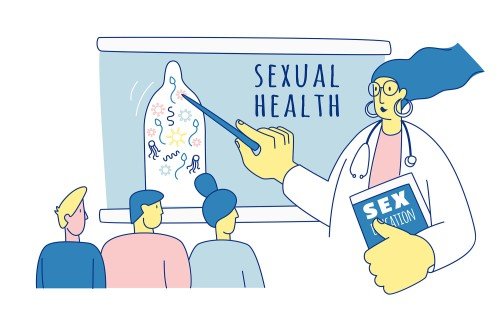Sexual education is a crucial part of a person's overall education, yet it is often overlooked or dismissed as taboo. However, a comprehensive sexual education is essential for individuals to have healthy relationships and make informed decisions about their sexual health.
At its core, sexual education is about understanding the human body and the various aspects of sexuality, including anatomy, reproduction, and sexual behaviors. It should cover a wide range of topics, including consent, contraception, sexually transmitted infections (STIs), and sexual orientation and gender identity.
One of the most important aspects of sexual education is teaching about consent. Consent means that all parties involved in a sexual encounter must give enthusiastic and ongoing consent throughout the experience. This means that consent cannot be given if someone is under the influence of drugs or alcohol, and it can be withdrawn at any time. Teaching about consent is essential for preventing sexual assault and ensuring that all sexual encounters are safe and respectful.
Teaching about consent is a crucial part of sexual education. It is essential for individuals to understand what consent means and how to obtain it before engaging in any sexual activity. Consent means that all parties involved in a sexual encounter must give enthusiastic and ongoing consent throughout the experience. It is important to note that consent cannot be given if someone is under the influence of drugs or alcohol, and it can be withdrawn at any time.
Consent should be taught in a way that emphasizes that it is necessary for all sexual encounters, whether it is a first-time sexual experience or a long-term relationship. It should be taught that it is important to communicate verbally with partners and understand that non-verbal cues may not always be clear.
Furthermore, individuals should be taught how to recognize and respect when someone has withdrawn their consent. They should understand that no means no, and that pressuring someone into sexual activity is not acceptable. Teaching about consent also involves discussing the importance of respecting personal boundaries and understanding that each person has their own limits.
It is important to incorporate practical scenarios into teaching about consent. Students should be encouraged to role-play scenarios to practice asking for and giving consent. This can help them gain a better understanding of how to communicate effectively with partners and understand what enthusiastic and ongoing consent looks like.
In conclusion, teaching about consent is an essential part of sexual education. It is crucial for individuals to understand what consent means and how to obtain it before engaging in any sexual activity. By teaching about consent, individuals can promote healthy and respectful sexual behaviors and help prevent sexual assault.
Another important topic in sexual education is contraception. Individuals must understand the different types of contraception available to them, how to use them effectively, and their potential side effects. Teaching about contraception can help reduce unintended pregnancies and STIs.
Sexual education should also cover STIs, including their symptoms, transmission methods, and treatment options. Students should be taught about the importance of regular STI testing and the steps they can take to prevent the spread of infections.
Lastly, sexual education should be inclusive of all sexual orientations and gender identities. Students must learn about the diversity of sexual orientations and gender identities and understand that they are all valid. Additionally, they should be taught about the unique challenges that LGBTQ+ individuals may face and how to be supportive allies.
In conclusion, sexual education is an essential component of a well-rounded education. It provides individuals with the knowledge and skills necessary to make informed decisions about their sexual health and relationships. A comprehensive sexual education that covers topics such as consent, contraception, STIs, and LGBTQ+ inclusion can help promote healthy and respectful sexual behaviors.
